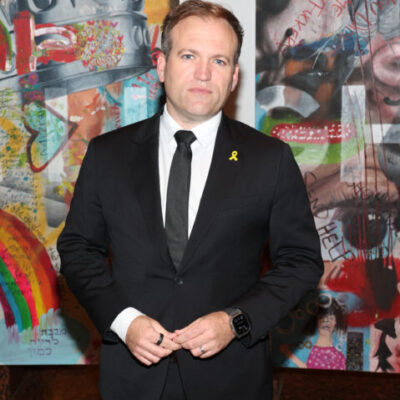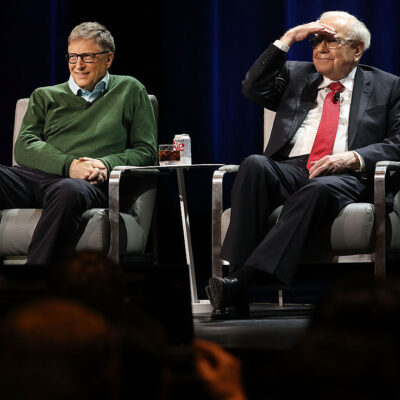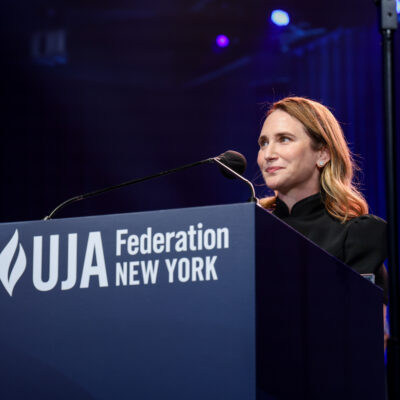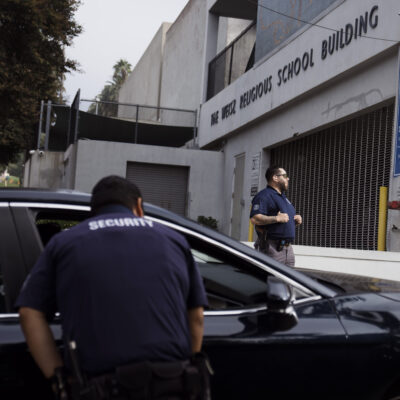ORGANIZATIONAL RESTRUCTURING
USCJ rejiggers racial inclusion program, cutting part-time role, as it beefs up social justice work
Advocates describe the dismissal of the movement's racial justice specialist as a 'bump in the road,' not a shift in priorities
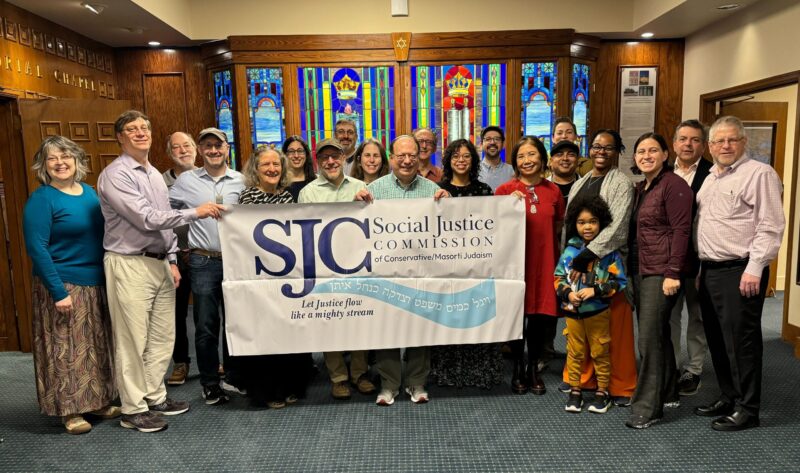
Courtesy/USCJ
Members of the United Synagogue of Conservative Judaism's Social Justice Commission.
Since President Donald Trump issued an executive order in January against diversity, equity and inclusion programming in the federal government and the social sector, such initiatives have been gutted across the country, with federal funding slashed and major corporations, such as Disney, Google and Target ending programs, along with many nonprofits.
When the United Synagogue of Conservative Judaism dismissed Tony Westbrook Jr., its part-time racial justice and inclusion specialist at the end of last month, some in the movement worried that the umbrella group was following suit.
This was the concern of Rabbi Heather Miller, who was invited onto the USCJ board, serving as co-chair for the Racial Justice Committee of the USCJ’s Social Justice Commission, in the wake of the George Floyd murder in 2020. “I was very vocal about this, that once… it was out of fashion to hold DEI at the center… that this work would get dropped,” Miller told eJewishPhilanthropy, adding that this “would be the most harmful thing.”
But Miller and other racial justice advocates in the movement are hopeful that Westbrook’s dismissal — while disappointing on a personal level — represents only a “bump in the road” caused by a shift in funding and that the movement will not only continue its racial inclusion work but increase it going forward.
In fact, USCJ recently received a surge of funding towards its social justice work in the form of a $3 million grant, paid out over five years, Rabbi Ashira Konigsburg, the chief movement strategy officer for USCJ and the Rabbinical Assembly and the chief operating officer for the Rabbinical Assembly, told eJP.
The Conservative movement is about to hire a full-time director of social justice and public policy who will oversee its volunteer Social Justice Commission, which includes a committee for racial justice, Konigsburg said. The commission will decide how to allocate the funds.
“I can assure you that these changes have nothing to do with anything going on in the political arena whatsoever,” Westbrook’s position was “somewhat of an anomaly,” Konigsburg said. Launched in May 2022, it was funded by a grant from a private foundation that continues to fund USCJ, but has pivoted to supporting “other areas,” she said.
Westbrook’s dismissal on June 30, the end of USCJ’s fiscal year, came alongside a decision to cut an interfaith families-focused position, though that move raised greater concerns from advocates that the move signified a potential shift in the movement’s policies as it considers allowing rabbis to officiate interfaith weddings.
Westbrook, who is a second-year rabbinical student at the Ziegler School, told eJP he’s proud of his work within the movement, including “launching the USCJ DEI resource hub and leading a national 1619 Project: A New Origin Story [book discussion group] cohort that included over 14 communities nationwide — each with 20-plus participants — including one non-USCJ affiliated synagogue.” (The 1619 effort is based on a contentious initiative, The 1619 Project, by The New York Times’ Nikole Hannah-Jones, which portrays American history through primarily racial terms and has been challenged by historians across the political spectrum.)
As others scrub DEI from their websites, Westbrook’s resources remain prominent on the USCJ webpage, and the USCJ is holding a second cohort of the 1619 Project beginning this fall.
During his time with the USCJ, Westbrook learned “how deeply some people across in Conservative Movement want to engage in meaningful conversations about race, identity, and belonging—and how important it is to meet communities where they are with empathy and honesty.”
Since joining the board, Miller, who is also president of her Brooklyn Conservative congregation and the founder of The Multitudes, an organization that supports Jews of color, has seen such investment that she has faith in the movement.
The original webinar Miller attended birthed the three-day virtual “Kol Tzedek: A Conference on Racial Justice,” at which she presented. The movement also partnered with JOIN (Jewish Organization Institute and Network) for Justice to offer “Don’t Kvetch, Organize” courses, teaching ways for Conservative Jews to effectively advocate for change. They have also led a Racial Justice Pilgrimage to New Orleans and Mobile and Montgomery, Ala.
“The optics are not great,” Miller said about the positions being cut. “This is personal for me. It’s not just professional. It would be really disappointing if this went a different way… Our next steps are very important because people are watching,”
Miller’s relationship to Westbrook is also not simply professional. She considers him a friend. Before the cuts were announced, she said Konigsburg called her personally.
“I can only imagine what this looks like to you,” she remembered Konigsburg said, promising that the USCJ was invested in racial inclusion work and the cuts had nothing to do with an attack on DEI. “That’s not what’s happening, and that’s not what the motivation was.”
Watching the movement grow with such focus and determination over the past five years has been “inspiring,” Miller said, and she feels “empowered as the co-chair of the racial justice subcommittee.” But she’s concerned that other Jews of color will jump to the conclusions that she originally worried about and see this as a disengagement from inclusion work.
Konigsburg recognized that there is still “lots to do” around inclusion, especially for Conservative Jews of color who have “sometimes not felt supported by individual encounters or by whole [Conservative] communities.”
The movement is reorganizing its racial justice work, not abandoning it, Rabbi Amy Eilberg who co-chairs the Racial Inclusion Committee with Miller, told eJP.
“Everybody who knows the nonprofit world, when a grant ends, you either have the money to replace it or you don’t,” she said. “There’s a lot of excitement about how we’ll use [the new $3 million grant] to strongly build the movement’s work in these areas.” Miller believes it could even lead to working with Westbrook again.


